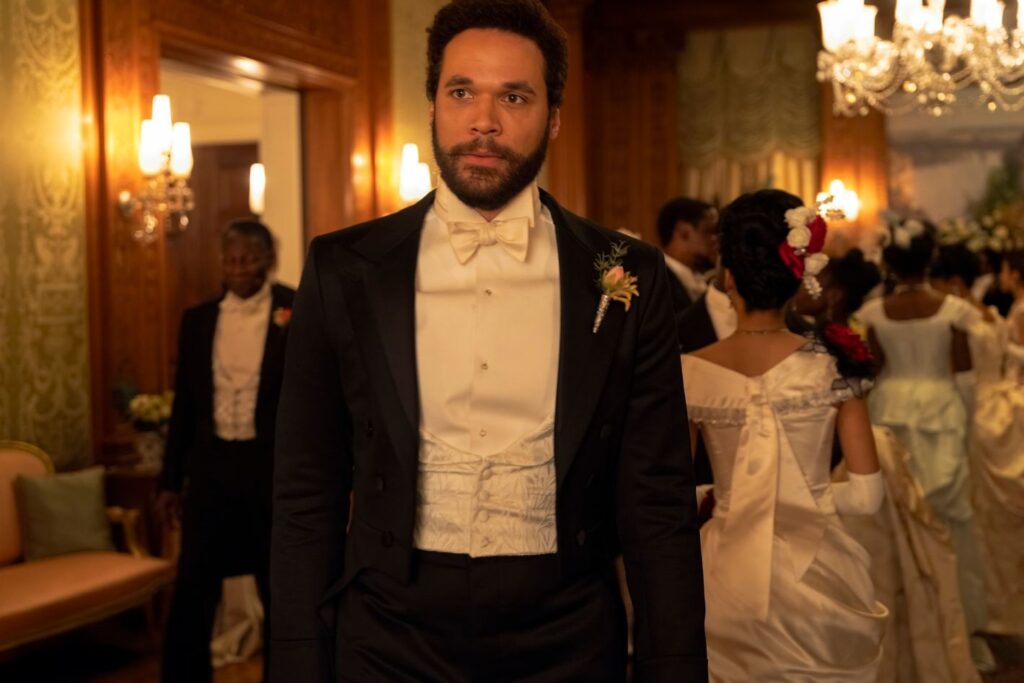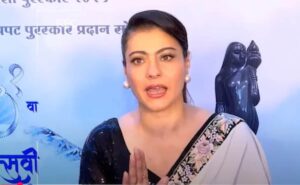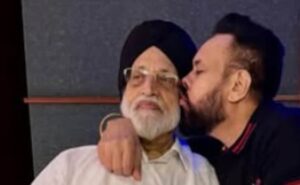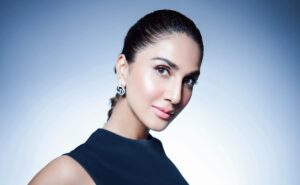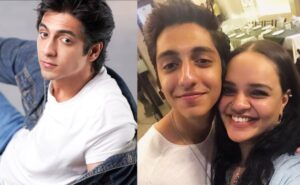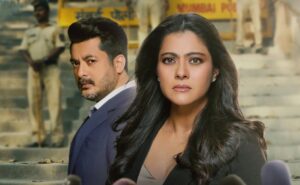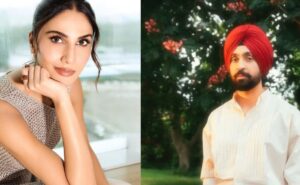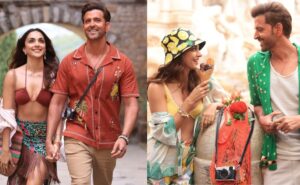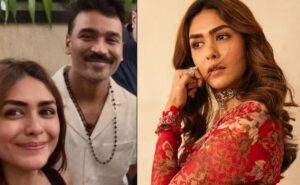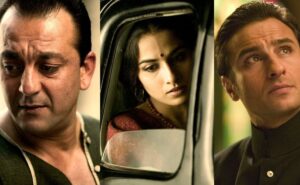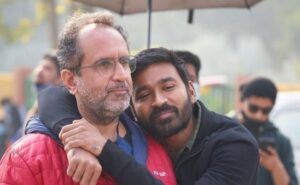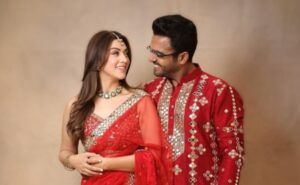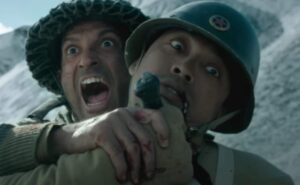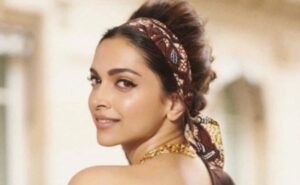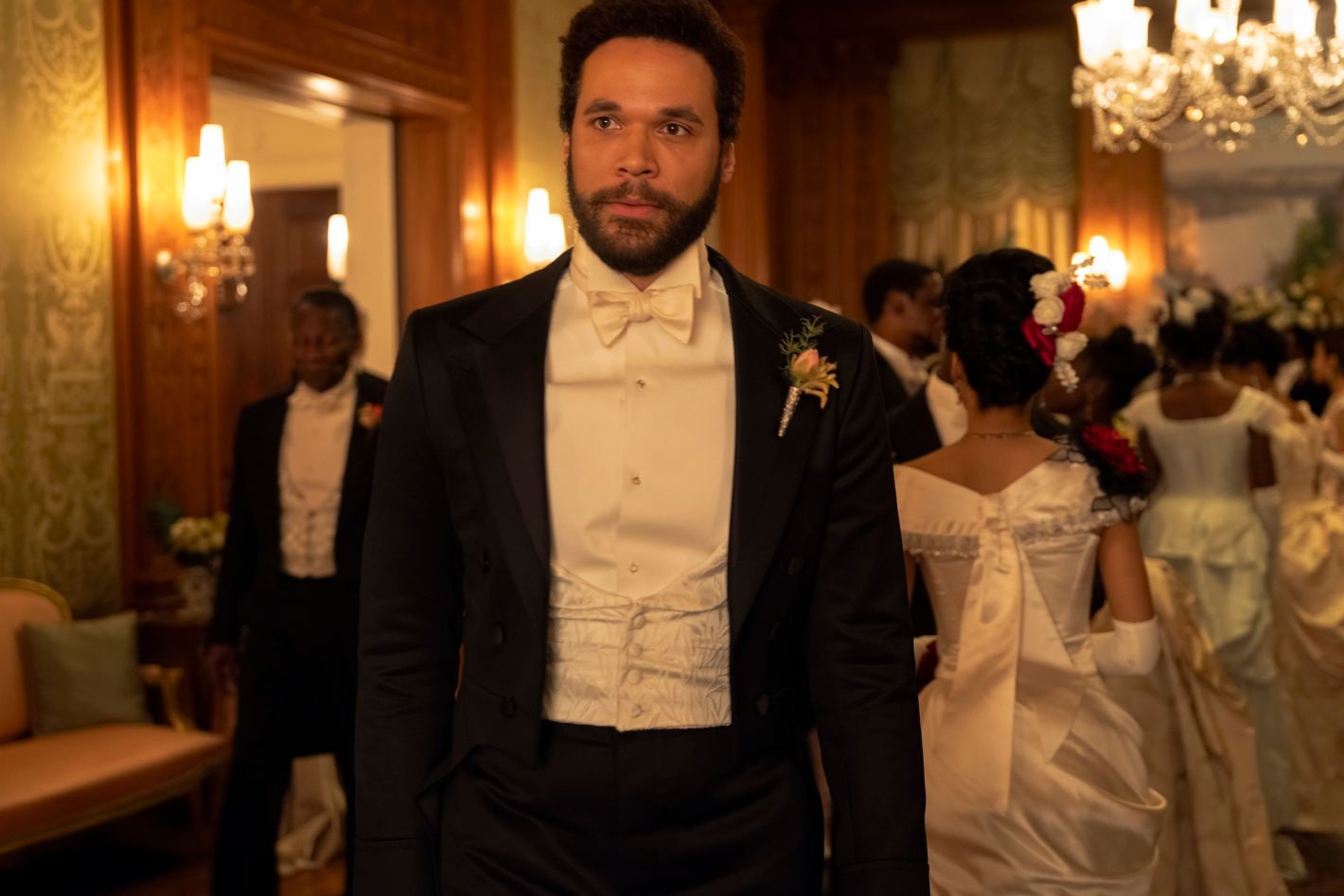
Is there anything dreamier than being loved for your convictions? This season on The Gilded Age, Peggy finally gets a glorious romance courtesy of Jordan Donica’s Dr. William Kirkland, who is instantly smitten with the writer after caring for her at the Van Rhijns’. The two court on the cliffs in Newport, but his mother, Elizabeth Kirkland (Phylicia Rashad), disapproves of Peggy’s heritage — the Kirklands descend from a line of free Black people, while Peggy’s father was formerly enslaved — not to mention her activism. Why, Elizabeth wonders, wouldn’t Peggy focus on becoming a mother instead? In this week’s episode, Mrs. Kirkland finally gets the information she believes she needs to break up the pair when she learns Peggy had a child given up for adoption. She rushes to tell her son, and it’s unclear going into the finale whether he’ll reject Peggy and her past.
Donica is no stranger to a period piece. The musical-theater actor has starred in My Fair Lady and Phantom of the Opera on Broadway and will play Joe Hardy in Arena Stage’s upcoming Damn Yankees. Here, though, unlike in My Fair Lady or Phantom, he’s playing a pre-21st-century romantic lead who is Black in the script. “I said to the EPs Michael Engler and Sonja Warfield, ‘Usually I have to play this subtext in a show, but now I don’t feel obligated to have an excuse for my existence,’” Donica says. “I love fantasy, but this is a part of our reality.”
What was your context for The Gilded Age walking into the show?
I knew it was the same creator as Downton Abbey, and I worked with a few people who had done Downton on My Fair Lady, so I understood that the world was similar to other period pieces. I’ve played characters from 1700s and 1800s France, 1800s and 1900s England, and now, finally, late-1800s America. I was scheduled to do Phantom of the Opera in London, and this audition came very last-second. I met with Sonja and Michael on Zoom. They sent me the Kirkland stuff they had written so far, and I read it and did my research on the time period here in America, specifically in Newport, and learned a lot of quick history about free African communities and free Black communities in Rhode Island. We had a discussion. I talked about how I imagined the character as a bridge between worlds generationally. Then I got the job.
What was your entry point into the character?
Historically, I found Dr. Marcus Wheatland, who was a doctor that came from the Caribbean islands and settled in Newport about four years later than our story takes place. He was very light-skinned. He was educated down at Howard University and came to Newport, Rhode Island, to help build that community out there. He was the first doctor to use the X-ray machine as a diagnostic tool. There are people like Dr. Kirkland who existed in this world.
Then it became about balancing the relationship he has with his mother and his potential lover and bringing the old generation of thinking into the new. He doesn’t want to leave them behind because that doesn’t solve anything. I think that’s something that’s still a problem today.
On the page, he felt very much like me. I love romance too. He’s someone who knows what is expected of him romantically from his mother, and he’s not willing to go there. He wants to live his own life, and those choices are evident by him going down to Howard. He’s a quiet rebel.
The episode ends with Mrs. Kirkland revealing to her son that Peggy had a child, potentially out of wedlock. How did you go about receiving that news?
It’s just heartbreak, right? It’s heartbreak for Peggy, it’s embarrassment that my mom has taken such lengths to try to bring her down. Also rage. I remember filming that scene, and there’s a couple takes where I just raised my voice. I was reminded by our director, Salli Richardson-Whitfield, that that’s not appropriate. He was raised to speak his mind, but, in many Black households and my own household, you’re raised with a certain amount of respect for your elders, even if you disagree with them. We see it in different ways in other households in the show, but that’s also an example of how different cultures operate. I was given that note of, “She would smack you across the face if you raise your voice like that.”
It was a good exercise, because all of that is brewing underneath. He wants to pop off and he wants to defend Peggy, but he also doesn’t have the facts. He doesn’t want to make any decisions without knowing what’s what. He knows his mother loves to talk, so he needs to talk to Peggy to see if this information is true. There’s a modicum of responsibility that he feels. When Denée Benton and I were talking about it, I said, “Remember you tried to tell me?” William said, “No, don’t worry about it, girl. It’s all good. We all have a past.” That’s part of William’s responsibility too. Peggy’s not alone in all of this.
You don’t think he has any animosity toward her?
Not at all. She’s the victim here! Her chance at a proper marriage was taken away from her by her father, and her chance of being a proper mother was taken away by her father. Since then, she’s had to build her life. On the other side of all of the heartbreak is even more admiration for the fact that she is who she is in spite of these other things.
Where did William’s progressiveness come from? His mother obviously didn’t raise him to feel that way.
All of his siblings have gone off and done their mother’s plan for them, and he’s the only one who made his own plan. Phylicia and I talked about that, too. She’s like, “You’re my little troublemaker.” And I’m like, “Yeah, but I do it with a smile on my face. I’m still the person that you raised me to be.” His time down at Howard also shaped him immensely. He had a very specific type of schooling, and he had a very specific way that he was taught to speak. When he goes to Howard and he’s inundated with these different Black experiences, he starts to pick up on different ways of code switching. I wanted to implement all of these things into the character, depending on who he’s talking to and who he’s around.
Phylicia has kind of a banger line in the previous episode, when William says that he would respect a woman who fought for equal rights, and she says, “You would respect a woman who did that, not a wife.” How do you think William took that?
That’s actually one of the only scenes of mine that has been cut. That’s actually only half of what we shot; originally, William says, “Not everyone is like you and Father with love.” It was this playful conflict of conversation: Us young folks want to do it our own way.
That was mine and Phylicia’s first scene that we shot together, and the way it felt when we were playing, it was, Yeah, I respect your opinion, but the conversation actually made me more emboldened in my love for Peggy, because I’m disagreeing with my mom about love. She was like, All right, kids will be kids. She still didn’t believe it’s a lasting thing.
I imagine they cut it because they want to keep the audience on edge as to how William is feeling and where he’s going to go. That was something we talked about as we shot. Sometimes I would play William’s point of view a little too obviously. For the storytelling, there’s more for the audience if you think he’s going one way, but in the end, he goes another.
Why do you think William is still single at the time that we meet him?
In this episode, when they’re picnicking, he says, “Most women busy themselves with idle things and things that don’t matter, things that my mom loves, but you are different.” He places a lot of value in someone who has a sense of self and a sense of purpose outside of their duty and obligations to their family. This is where his father and his philanthropic religious beliefs come into play. Because of the way William was raised and educated, he needs someone who can stimulate and challenge him. I don’t want to say this in a negative sense, but these other women wouldn’t necessarily have an opinion.
Or they’ve been taught not to.
Yeah, exactly. His opinion is my opinion. I don’t think William holds that against them, but he can’t deal with that. I think his mother is very similar. She’s very opinionated. A man loves his wife how he loves his mom, essentially, in the Freudian sense. His mom is a very strong and opinionated person. She is a very powerful person. She stands in her own truth. Is she a bit of a hypocrite? Yeah. But all of those qualities she has, he sees in Peggy, too.
I talked to Denée earlier this season, and I got the sense that, for her, season three was a culmination of things both she and the show had been working toward regarding its representation of the Black community. How did it feel to enter this season?
Because I didn’t read [from the script] when I met with Michael and Sonja, I could feel everyone’s collective assholes loosen a little bit on my first day. They were like, Okay, okay, he’ll be fine. We have a dialect coach we all work with, and everyone was so thoughtful about the work that they do, and because they’re so thoughtful, they’re also supportive and open to what I’m bringing.
We did the hair and makeup test, we did the costume test. Everything wasn’t quite right, but then when you put it all together on the day, magic happens, and all of a sudden there’s Dr. Kirkland. No one knew I was Jordan because I was speaking so differently and I was wigged. I have a huge Afro, and I was willing to cut my hair, but the hair and makeup team were like, Nah, let us do our magic. None of us were sure how it was going to go, but then I stepped on set and everyone reintroduced themselves. They didn’t recognize me. I remember being at our wrap party talking with the crew, and it took some people a while to realize I was the same person.
For a musical-theater person, it must have been crazy acting alongside not only Denée, but Audra McDonald, Phylicia Rashad, Brian Stokes Mitchell, and John Douglas Thompson. How was that?
“AAaaaghhgaAAA.” That’s what it felt like. The people you meet doing shows and hang out with in those circumstances prepare you for these moments. Do not be awestruck, but dive into their humanity. We’re all humans. I’d gotten to work with Dame Diana Rigg on My Fair Lady. Phylicia was great because she feels like all of our mothers. The first thing she said to me in the makeup trailer was, “Son!” And I was like, “Ma!” It was just smooth sailing from there.
Most of the time, we would talk in character. We didn’t have much time to get into the nitty-gritty details, so the more time we spent on set doing that work together, the better. I had many conversations with her about Peggy, her feelings toward Peggy, about her past, and about my past. It doesn’t necessarily show up on the page; it shows up in the scene. She’s so lovable, even when she’s saying just the most biting things. It’s like, Oh, there she goes again. It’s not that she disrespects Peggy as a person, she just doesn’t want Peggy to be in her family.
You’ve been cast in almost solely period pieces. Why do you think that is?
My training is a huge part of that. I’ve trained as an actor, a dancer, and a singer since I was 10. That’s classic opera, ballet, tap, jazz, and Shakespearean training. I also love philosophy, so I love to be a student of history. I often get inserted into these pieces because I already know a lot about that time period worldwide. As a biracial person, what’s cool is that you see people like me when you do the research. I always look to find myself in whatever period I’m working in. The world is an ignorant place full of ignorant people. There’s always going to be someone who cries foul and says, People like you didn’t exist in X, Y, and Z place at X, Y, and Z time. I love to have receipts: Actually, if you read a book, and here are several for your reference, whether it’s Black Edwardians or just knowing that Alexandre Dumas was a quarter Black. When I was doing Phantom of the Opera, trying to find African descendants in that time period was way easier than I thought. Same with My Fair Lady.
With The Gilded Age, race being on the page meant everything to me. I love proving people wrong and showing people there’s more to history than they think. That’s not revisionist history, that’s expansionist history — and that’s just history. A lot of people don’t know, and the people that do are constantly told it’s not real. So that representation is important, and I feel honored to be asked to tell this story.
More ‘The Gilded Age’
“We didn’t have much time to get into the nitty-gritty details, so the more time we spent on set doing that work together, the better.”

